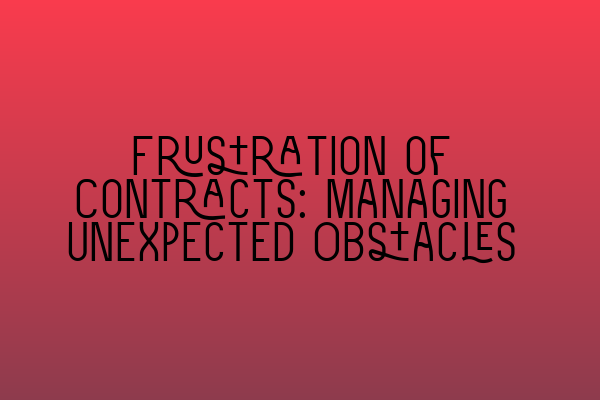Frustration of Contracts: Managing Unexpected Obstacles
In the world of contract law, no matter how meticulously drafted and carefully negotiated a contract may be, there are times when unforeseen circumstances arise, rendering the performance of the contract impossible or radically altering the fundamental purpose of the agreement. This is where the legal doctrine of frustration comes into play, allowing parties to address unexpected obstacles that make it impossible to carry out their contractual obligations. In this blog post, we will delve into the concept of frustration of contracts and explore how to effectively manage and navigate through these unforeseen challenges.
What is Frustration of Contracts?
Frustration of contracts refers to a legal doctrine that can be invoked when unforeseen events occur, rendering the performance of a contract impossible, illegal, or fundamentally different from what was initially contemplated by the parties. It acts as a safety valve, releasing parties from their contractual obligations when it would be unjust to enforce them in light of the unforeseen circumstances.
Common Examples of Frustration
There are various situations that may give rise to frustration of contracts. Some common examples include:
1. Government Intervention: Changes in legislation or government regulations that make it impossible or illegal to carry out the terms of the contract.
2. Destruction of Subject Matter: When the subject matter of the contract is destroyed or becomes impossible to access, such as in cases of fire, natural disasters, or theft.
3. Illness or Death: In circumstances where the performance of the contract is prevented by the illness or death of a party who is essential to the contract.
4. Unforeseen External Events: Events such as war, strikes, or pandemics that significantly disrupt the ability to perform contractual obligations.
Managing Frustration of Contracts
When faced with a situation where frustration may apply, it is crucial to assess the circumstances and consider the following steps:
1. Review the Contract: Carefully examine the terms of the contract to determine if there are any clauses that address unforeseen events or provide for remedies in case of frustration. These clauses may include force majeure or termination provisions.
2. Gather Evidence: Collect all relevant evidence to support the claim of frustration, such as government regulations, medical reports, or documentation of the unexpected event that prevents performance.
3. Notify the Other Party: Promptly inform the other party about the situation and the potential application of frustration. Open communication is key and may facilitate an amicable resolution or negotiation of alternative arrangements.
4. Seek Legal Advice: Consult with a contract law solicitor to assess the applicability of frustration to your specific situation. They can provide expert guidance and help navigate the complexities of the legal process.
5. Document Everything: Maintain meticulous records of all communications, contracts, and evidence related to the frustration. These documents will be crucial in supporting your case should any disputes arise.
Effect of Frustration on the Contract
When frustration is successfully invoked, the doctrine operates to automatically discharge the parties from their future obligations under the contract. However, it does not affect past obligations or liabilities unless the contract stipulates otherwise. In some cases, the parties may agree to renegotiate the terms of the contract or seek restitution for any benefits conferred before the frustration occurred.
Conclusion
Frustration of contracts is a legal doctrine designed to address unforeseen and exceptional events that render the performance of a contract impossible or fundamentally different. By understanding the concept, recognizing the common examples, and following the appropriate steps, parties can effectively manage unexpected obstacles and navigate through the legal complexities associated with frustration. If you find yourself in such a situation, it is essential to seek professional legal advice to ensure your rights and interests are protected.
For further related articles, please check out the following:
1. SQE 1 Practice Exam Questions
2. SQE 1 Practice Mocks FLK1 FLK2
3. SQE 2 Preparation Courses
4. SQE 1 Preparation Courses
5. SRA SQE Exam Dates
These articles provide valuable information and resources that can assist you in your legal studies and preparation for the SQE exams.
